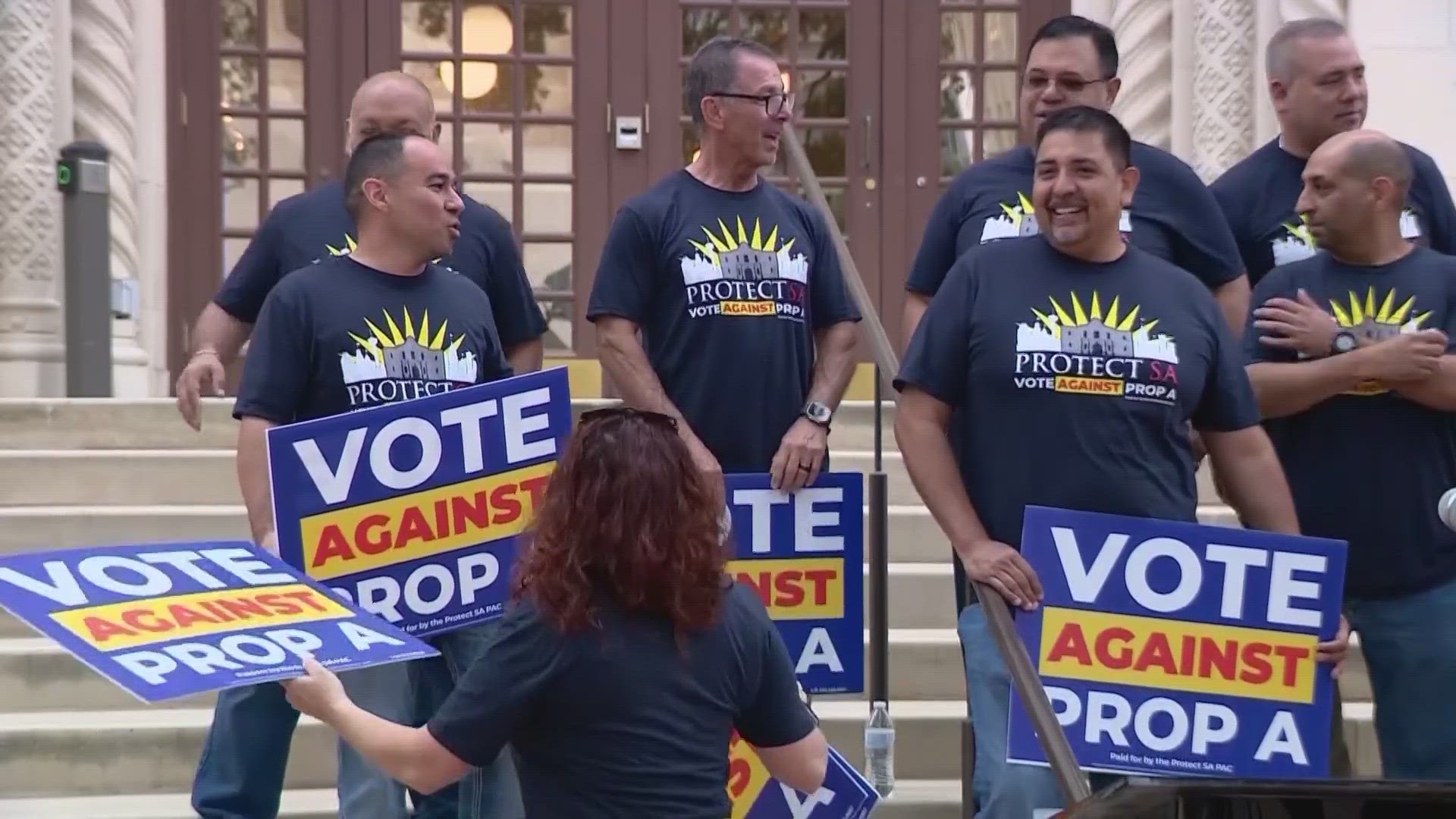SAN ANTONIO — San Antonio's Proposition A was defeated Saturday by nearly a 3-to-1 margin. The final vote totals were still being counted Saturday evening.
Proposition A, referred to by supporters as the San Antonio Justice Charter, is an omnibus measure that sought to decriminalize abortion and low-level marijuana possession, ban no-knock warrants and chokeholds by law enforcement, create a “justice director” job at City Hall and require police to issue citations for certain low-level, nonviolent offenses instead of making arrests.
Danny Diaz, president of the San Antonio Police Officers Association (SAPOA), said Saturday night it was a hard-fought battle after three months of campaigning against the measure.
“How is it right to go against what we were all taught as kids: Don’t lie, don’t cheat or steal?" Diaz told KENS 5. "This proposition, quite frankly, was about that. It wasn’t about marijuana, it wasn’t about abortion. Those things are dealt with at the state level."
Diaz said SAPOA contributed to the nearly $2 million raised against the measure, while three local chambers of commerce also supported their efforts. Political figures including U.S. Rep. Tony Gonzales and Mayor Ron Nirenberg had also spoken out against Prop A in recent weeks.
Diaz specifically took issue with proposed changes to the cite-and-release policy and initiative that would have required officers to give tickets for some non-violent crimes, including theft and graffiti.
"They wanted all Class C offenses with the exception of alcohol (to be) non-arrestable, (saying) that they weren’t violent crimes. We disagreed with that."
ACT 4 SA Executive Director Ananda Tomas said she was proud of the grassroots efforts despite the ballot measure's defeat.
"We made our elected leaders talk about it. It's something they have to think about that's going to inform future policy," Tomas said, adding she believed the margin of votes would've been closer.
It's the second time such a ballot initiative failed, but Tomas says there are other initiatives surrounding public safety in the works.
Despite legal challenges to break up the proposition, all measures were presented to voters in one bundle—a strategy Tomas said she doesn't regret.
“I think some things might’ve been able to go through by themselves. But we learned, and we’re trying new things," she said. "At the end of the day, we knew we wanted to have a conversation about what true public safety looks like."
How we got here
ACT 4 SA got the measure on this year's ballot gathering enough signatures in the winter months.
But it ran into another hurdle when an Austin-based anti-abortion group filed a petition in the courts, saying Prop A's various ballot measures should be voted on independently of one another. On March 17, the Texas Supreme Court denied the petition 6-3, citing, in part, its objective not to interfere in elections.
One of the main points of contention, however, came down to enforceability. City Attorney Andy Segovia said earlier this year that Texas law supersedes local ordinance when it comes to nearly everything the Justice Charter was seeking to do, save for one goal: the creation of a justice director position.
An uphill battle
In terms of campaigning dollars, Prop A was fighting a losing battle.
As of the Tuesday before Election Day, about $441,000 had been spent in support of the proposition while more than $1.8 million had been spent in opposition, largely by the PAC Protest SA and SAPOA.
And in early April, just a few weeks before early voting began, one major name came out against Proposition A: Mayor Ron Nirenberg, who is almost sure to win a fourth term and who called the measure "problematic" in that it collects "so many issues into one single proposition, forcing people to vote up or down one time."
Tomas took issue with Nirenberg's reasoning for opposing Prop A. According to her, city leaders had their chances to take concrete action on the various issues raised by the measure.
What Prop A would've represented if it came to pass, Tomas previouslys said, is "a clear message (on) where San Antonio stands on abortion access, on marijuana decriminalization, on policing and public safety that will guide city policy for years to come."
Speaker to KENS 5 before Saturday's election, Jon Taylor, chair of political science at UTSA, emphasized how much money the opposition had poured into their campaign.
"The Vote No forces were able to set the narrative early by starting that this was about law and order," Taylor says. "The dubious legal ground for the city to enforce the Justice Charter likely didn't help make the case with voters."
Taylor previously said the aftermath of Saturday's result – now determined a defeat for Prop A after voters made their voices heard – might show if ACT 4 SA is willing to reach its goals through a "multipronged approach," while conceding that Nirenberg has his own priorities for changes to the city charter.

